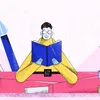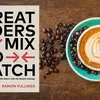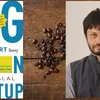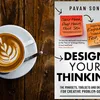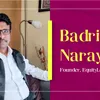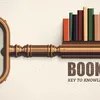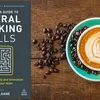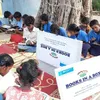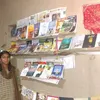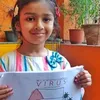Creativity habits, influences, journeys: Tips and stories from the authors at Bangalore Business LitFest 2021
How does an author get inspired and become successful? Find out in these insights from speakers at the Bangalore Business Literature Festival.
The seventh annual Bangalore Business Literature Festival (BBLF) will be held virtually this year due to the ongoing pandemic. As the festival media partner, see YourStory’s coverage of the earlier editions in 2020, 2019, 2018, 2017, 2016, and 2015.
See also YourStory’s Book Review section with reviews of over 320 titles, and our compilation of 85 Quotes on World Book Day.
BBLF 2021 will be held on September 21-23 next week. Our earlier four preview articles addressed startup advice, failure recovery, business resilience, and reader patterns. In this article, authors discuss their creativity habits, influencers, reader reactions, plans for their next books, and tips for aspiring writers.
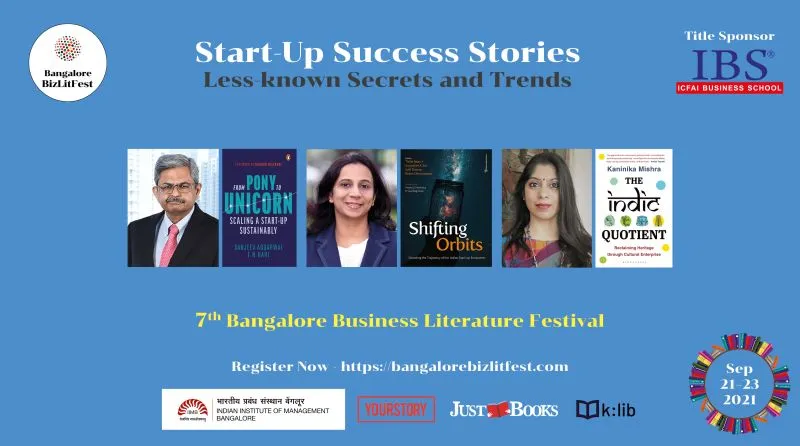
1. Creativity habits
“I have some unusual habits as a writer. I only like to write when inspired, and the words flow,” says Bhavna Dalal, Founder and CEO of Talent Power Partners, and author of Checkmate Office Politics.
“Most of my writings come from the real-life experiences of executives and leaders in the workplace as part of my coaching work. Although an avid reader in my childhood and teens, I consciously don’t read other books when I am writing,” she adds.
“I do jot down ideas immediately when they come to me, such as in a flight, while walking, or during other mundane activities. Later, I sit down to develop them. Meditation is a powerful practice to develop as a writer,” Bhavna emphasises.
“Journaling helps you to gain better clarity on your thoughts and ideas, and also clear up any roadblocks you may have that are clogging your mental bandwidth,” says Karthik Nagendra, CEO of ThoughtStarters, and author of The Thought Leader Way: Leading Your Business with Thought Leadership in an Altered World.
“Being a certified life coach, I understand the value of journaling and recommend to my clients that they practice journaling regularly,” he adds.
Karthik also practices painting and listening to music that boosts creativity. “Going on long drives, too, has helped me as it gives ‘me time’ to think about the book idea more clearly,” he says.
“I don’t keep a journal, but I have a notebook where I write down ideas. Of course, I read a lot, but there is no target in a week or month. I do listen to music a lot,” says Hari Pulakkat, author of Space. Life. Matter: The Coming of Age of Indian Science, and editor of science and technology magazine IITM Shaastra.
“I read a lot and across different genres. I also feel that time away from social media and its incessant noise is essential to remain creative. So, I ensure I have at least one day a week when I do not access social media,” explains Kaninika Mishra, author of The Indic Quotient: Reclaiming Heritage Through Cultural Enterprise.
“I dedicate an hour a day for writing of all kinds. Another hour a day to read and share content from my feeds and my website,” says Jessie Paul, CEO of B2B consulting firm, Paul Writer, and author of No-Money Marketing: From Upstart to Big Brand on a Frugal Budget.
“I also read fiction – whatever comes my way – for at least 30 minutes a day. I keep track of my ideas on Trello, a workflow tool,” she adds.
“One of the biggest challenges I faced initially was burnout because I was always thinking about and working on my research and book. That wasn’t healthy,” recalls Vivan Marwaha, user researcher and author of What Millennials Want: Decoding the Largest Generation in the World.
“The moment I started taking more time off, I not only started feeling better and had more energy, but I became much more productive as well,” he adds.
Rishad Tobaccowala reads every morning from 5 to 6 am. He is Senior Advisor to the Publicis Groupe and author of Restoring the Soul of Business: Staying Human in the Age of Data.
“I mark my books with pencil and star key lines. I then copy them with a pen into a notebook. I keep a visual journal of photographs using an app called Day One,” he says.
“I exercise every day. Getting my mind ready to write is super important,” says David Meerman Scott, author of The New Rules of Marketing and PR and Fanocracy: Turning Fans Into Customers and Customers Into Fans.
“I listen to audiobooks a lot and also read Kindle books much more than earlier,” says R Gopalakrishnan, author of over 15 books on management.
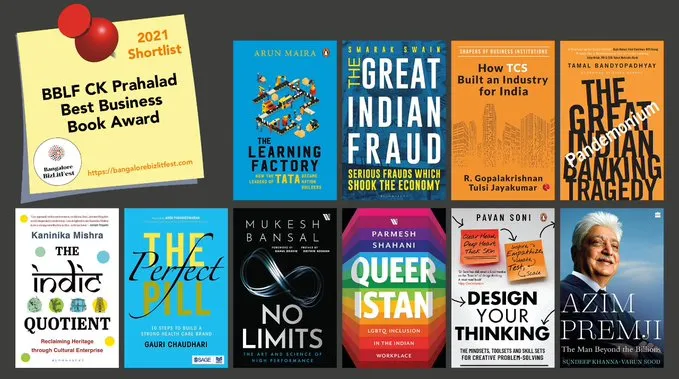
“I keep a notebook handy – always one in my pocket. I do keep a journal, and I regularly blog,” says Keel Hunt, author of The Family Business: How Ingram Transformed the World of Books. It unearths the story of the little-known Nashville-based company that today plays a pivotal role in the book industry.
“I am also a voracious reader – new books, classic literature, newspapers. I particularly enjoy reading other writers. My first interest is in non-fiction, and particularly biographies,” he adds.
“The bum-on-seat theory still holds true. One needs to write. Write everyday. Rewrite. There is no escaping that. Research can reach a point of procrastination,” says Tony V Francis, author of the novel The Autograph Seeker, and Chief Revenue Officer, Matrix Publicities(WPP).
“If you are a writer, you need to be a reader too. Among other things, it helps with ideas on narration,” he adds.
“In my writing journey, I have come to value my ‘pearls from life’. You might forget the breakfast you had this morning, but you will always remember incidents that made you laugh or cry, or were dramatic or profound,” he recalls.
“These become the crown jewels in one’s book. So when the pearls surface, I capture them on paper as a habit,” Tony says.
2. Creative influences
Fiction and nonfiction writers have influenced Hari Pulakkat. “I had studied English literature in college, and so I have read many great writers. It is hard to pick a few, but Henry James and Charles Dickens are two that I have enjoyed the most,” he says.
Among the writers after World War II, Saul Bellow and John Updike are his favourites. “I read a lot of comic fiction, and I enjoyed David Lodge and Malcolm Bradbury a lot. Among contemporary writers, I would pick A S Byatt,” he adds.
“It is hard to pick favourite nonfiction writers, because of the sheer variety. In travel writing, I read a lot of Paul Theroux and some Pico Iyer,” Hari says.
“In my own genre of science writing, two books (and writers) that I consider as the gold standard are Chaos by James Gleick and The Man Who Knew Infinity by Robert Kanigel,” he explains.
He also enjoys good books written by journalists. “There is something special about discovering a new subject and then writing about it,” he observes.
Karthik Nagendra has read a lot of non-fiction books around leadership, psychology, and history. As notable influences, he cites What got you here won't get you there (Marshall Goldsmith), Man’s search for Meaning (Viktor Frankl), Homo sapiens (Yoval Noah Harari), and A world with three zeroes (Muhammad Yunus).
“Each of them has impressed me with the research, insights, and narration that can make an impact on various aspects of an individual, business, and society,” Karthik adds.
Jesse Paul enjoys books on consumer behaviour and consumer economics. “They make me think. The most recent book was Talking to Strangers by Malcolm Gladwell. I like all his books,” she says.
“I even read The Bomber Mafia, which has nothing to do with business but was still a compelling read. Dan Ariely and Daniel Pink are other authors I enjoy. Freakonomics and The Undercover Economist are other fun books,” she adds.
Jesse reads a lot of non-fiction and popular authors like John Grisham and Jeffrey Archer every time she visits an airport. “I’m not a fan of autobiographies, but Becoming by Michelle Obama was compelling,” she recalls.
“From a marketing thinking perspective, I’d say Kotler’s textbooks, Al Ries, Jack Trout, David Ogilvy, and Rama Bijapurkar have influenced my thinking,” she says.
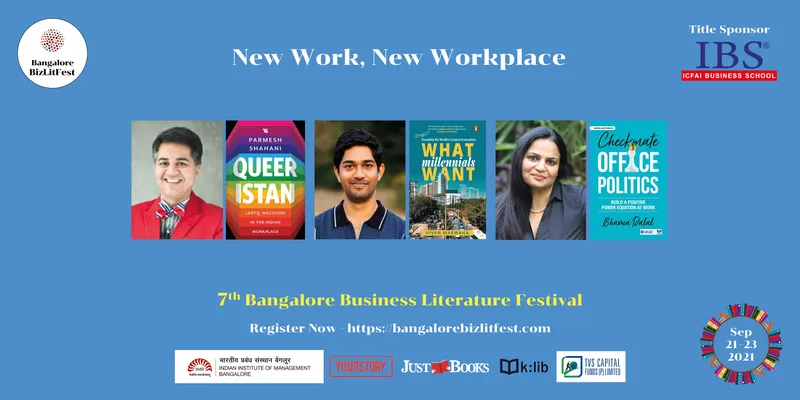
Among business books, Tony V Francis says he is influenced by Subroto Bagchi’s The Professional. “He got me interested in Indian business books. His book began with the story of Mahadeva, a resident in Bangalore who buried unclaimed dead bodies,” he describes.
“The book ended with an incident that took place in Bangalore again, with the newspaper headline reading 4 cops sell unclaimed body, get booted out,” he adds.
“Like any great thinker Bagchi captured the meaning professionalism in a single line: One is the ability to work unsupervised and, two, the ability to certify the completion of one’s work,” Tony explains.
3. Reader reactions
All the authors are proud their books are doing well, and share some unusual and inspiring reactions from readers.
“My LinkedIn, Instagram, and Twitter inboxes are full of messages from people many degrees removed from me telling me about how they have liked my book for its focus on those stories not always highlighted by the media,” Vivan Marwaha explains.
“It’s an amazing feeling to receive such praise from people you don’t know since that demonstrates the book is reaching a wide and diverse audience,” he enthuses.
“I received messages from people who read my book, saying they could identify what they needed to change in themselves to get out of repeated office politics patterns,” says Bhavna Dalal.
“The most common feedback has been about the positive twist on a negative subject. People are intrigued to know more about an Indian woman’s perspective on politics in the workplace,” she adds.
“My book has been very well received and continues to sell well. The most unusual response is that people think I wrote it post-COVID-19 because so many of the themes resonate even more now than ever before,” says Rishad Tobaccowala. His book has a chapter on managing distributed workforces.
“Since my book, The Indic Quotient, converges two contemporary themes, namely the growing pride in India's heritage and the passion for enterprise, it resonates with a large number of readers,” Kaninika Mishra explains.
The book coincided with the call for 'vocal for local' made by the Prime Minister in 2020 to promote indigenous products and ideas. “Therefore, the book became topical and generated interest,” she adds. A young budding entrepreneur even requested her to invest in his 'vocal for local' venture!
“My book, The Thought Leader Way, has been receiving a positive response from various segments – students, marketing professionals, CEOs, and entrepreneurs,” says Karthik Nagendra.
“It was heartening to see some of them practically try out some of the strategies and approaches shared in the book and seeing positive traction. They have personally reached out to me and shared their experiences,” he adds.
“My book, Marketing Without Money, is currently at the early review stage. I’ve shared it with people I look up to in the business world, and, so far, the response has been that it is a very useful book for anyone with a product to take to market,” Jesse Paul explains.
Her book has places where the reader can take notes and fill the answers from their own perspective into the frameworks provided. “That has been positively received as it makes the book more engaging. There is a demand for an audible version, which I’ve passed on to my publisher,” she adds.
“I think that my books have been well received. When the four publishers who have published my 16 books (17th coming in November 2021) still discuss new book ideas with me, I know they must have done reasonably well,” says R Gopalakrishnan, whose titles include A Biography of Innovations and Wisdom For Startups From Grown-ups.
He says the most unusual response from readers is, “How come there is no jargon or gyan, just simply anecdotes and examples?”
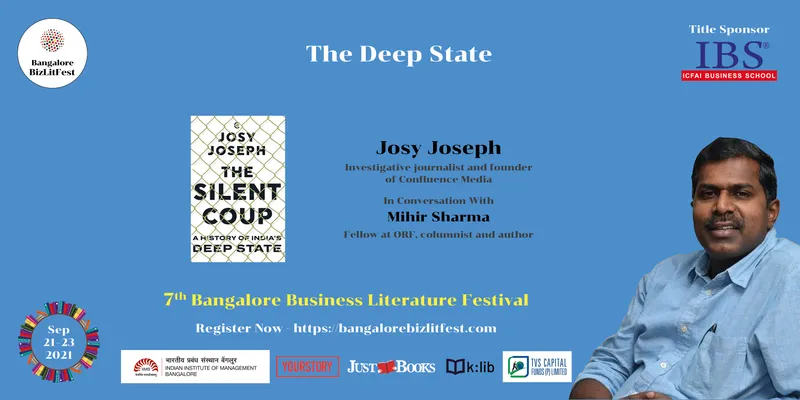
“Part of the appeal of my book, I believe, is the fact that Ingram’s story has never been told in its entirety. This has been a private company, always preferring for the Ingram customers to have the attention,” Keel Hunt says.
“Now, for the first time, readers are able to see inside the business behind The Family Business. It is now a global business, of course, and yet Ingram may be the most significant media company you never heard of,” he adds.
4. Author journeys
Some of the authors also share what excites them in the long journey of their books and what challenges they faced.
“The most exciting moment for an author is when a good book idea falls in place with a nearly audible click! The most challenging part is waiting to hear the sound of that click of a new idea,” says V Raghunathan, BBLF Chair and former Professor, IIM Ahmedabad.
“The most exciting part of an author’s journey is that you are positioned as an expert in the subject matter. When you see your ideas making an impact on people's lives, the satisfaction is priceless,” Karthik Nagendra enthuses.
“The most challenging part would be to market the book well to ensure it captures the mind share of readers, and thereby garner better sales,” he adds.
“Since my early days as a newspaper reporter, I have enjoyed the interview process – understanding a subject, getting to know an interviewee, and understanding a true story well enough for it to be engaging for a reader,” Keel Hunt recalls. He adds: “Truth, as we say, is often stranger than fiction!”
“The author’s journey starts when you have something to tell. It should be enthralling enough to keep you motivated over a long period. Only then will you have a finished book,” Tony V Francis advises.
“It’s like you’re in the ocean, and this idea you are holding on to for dear life is just about keeping you afloat," he adds.
“I write so that I can learn. The thing about learning is it changes your mind. That’s exciting,” Tony enthuses.
5. Next steps
Many featured authors at BBLF are already working on their next books or related projects. Others are exploring appropriate themes, formats, and publishers.
Kaninika Mishra is currently working on two ideas. “One is a book for children that uses some ideas from The Indic Quotient. The other is a non-fiction book focused on Northeast India,” she says.
“I have been travelling extensively in the Northeast and have covered five of the seven states as of now. I am absolutely fascinated by the beauty and culture of the region,” she enthuses.
Rishad Tobaccowala says his one-year-old weekly newsletter has over 10,000 subscribers and 40,000 readers a week due to social media and sharing. “It is scaling really fast and may preclude the need for a book in that it is a living book filled with wonderful art. The book may be a container of the past,” he explains.
Jesse Paul has written just under 500 issues of her newsletter. “The issues deal with a wide variety of topics – personal branding, diversity, marketing, strategy, and ethics. I want to curate these into a fast, snappy read,” she says.
Bhavna Dalal has already started work on her next book. “It will be about amplifying your influencing skills in the workplace. The approach is working inwards and on yourself to have the desired impact in the world outside,” she says.

Karthik Nagendra is working on is a business topic with a fiction approach. “Tentatively titled I and AI, it chronicles the journey of a teenage girl on an industrial visit to a leading AI-services corporation. There, the curious teen has a chance conversation with a cyborg,” he describes.
“A routine educational visit sets off a chain of events that forever entwines her future and that of the worlds. Set in 2035, I and AI explores the new world order built on AI and how it addresses the issues of the traditional world while inadvertently (maybe not so inadvertently) creating a new one of its own,” Karthik explains.
He says such a book requires an impassioned writer with a nuance for exploring the depths of the future face of AI and sensitisation towards the need for a gender-equal society. “The book’s theme pertains to AI and a woman’s journey into the tech space,” he adds.
“I have completed a book on behavioural economics, summarising the works of ten Nobel Laureates, telling the story of the transition of neo-classical economics to behavioural economics,” explains V Raghunathan.
His bestsellers include Games Indians Play, Ganesha on the Dashboard; The Corruption Conundrum; and Locks, Mahabharata and Mathematics. He has also been spending some time working on his collection of locks and showcasing them on a few platforms. Raghunathan writes occasional newspaper columns as well.
“I am also working on a new book (with my wife for the first-ever time) on what the educational system as a whole (teachers, parents, schools) needs to teach more of to children to help them cope with a complex world, and grow into more confident, strong, trustworthy, and dutiful citizens,” he adds.
Vivan Marwaha works at the intersection of people, policy, and technology. “I am fascinated by how technology is shrinking the opportunity gap around the world. My next book will most likely examine the role of technology in shaping the human endeavour,” he says.
“People love Fanocracy. It made the Wall Street Journal bestseller list,” says David Meerman Scott. He is working on the new eighth edition of his international bestseller, The New Rules of Marketing and PR.
R Gopalakrishnan’s next book is Pivots for Career Success: people and human relationships, along with R Srinivasan. Hari Pulakkat says he is thinking of exploring some ideas not fully developed in his first book but is also looking at other ideas.
Keel Hunt’s next book is another work of non-fiction. “My subject is a man who served over 40 years as a judge on the federal appellate court in the US. There is a great deal of interest now in the role of the judiciary in our national life,” he says.
Tony V Francis is writing two books in parallel. “One is a historical fiction that links the discovery of Queen Ketevan of Georgia’s relics inside the ruins of Goa’s St. Augustine’s Tower to the Safavid Empire. It is about the impact this discovery has on tightly-fought elections in the Caucasian country. The protagonist is a young Indian archeologist,” he describes.
The other book is non-fiction. “It has 75 stories of individuals and events told through their autographs as India celebrates 75 years of independence,” Tony says.
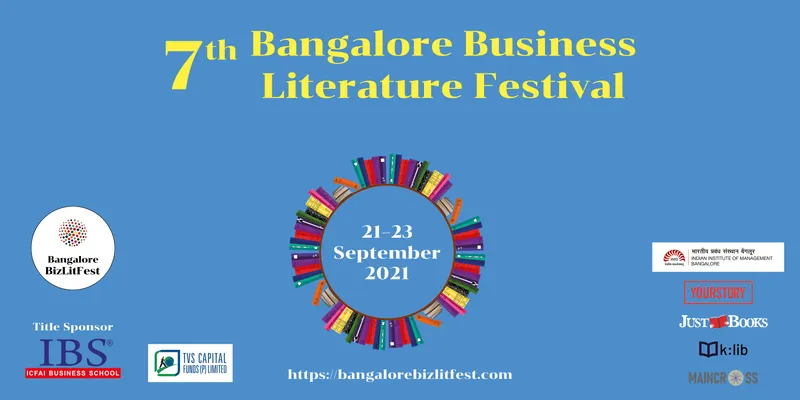
6. Tips for aspiring authors
The authors share a number of tips for aspiring authors on reading, writing, and market assessment.
“There is no difference between those who cannot read and those who do not read. And by reading, I mean reading books. Not online snippets or WhatsApp chatter,” advises Raghunathan.
“It takes time and effort and a lot of revision to write a book. Without patience, nothing can be achieved,” Hari Pulakkat says.
“All we have as a guide is our own taste. Even if your book covers an often-written about topic, remember there is no one who has lived your story,” Tony V Francis suggests.
“There is no one who is sharing the perceptiveness for the exact same purpose as you are. We have to share our unique story and perspective to create an impact. Most importantly, share the things you believe in, that not everyone will agree with,” he adds.
“Take the plunge. Swim as deep as you can. The result will be very rewarding,” advises Benedict Paramanand, co-founder of BBLF and author of CK Prahalad - The Mind of the Futurist.
“Don't write with the eye on Will it sell, Will I make money, Will anyone read my book. Write for yourself, for the experience of bringing alive an idea or a thought,” he adds.
Many more author insights, tips, and journeys will be shared at BBLF next week. “It's truly a festival of ideas, journeys, stories, and insights,” Benedict signs off.
YourStory has also published the pocketbook ‘Proverbs and Quotes for Entrepreneurs: A World of Inspiration for Startups’ as a creative and motivational guide for innovators (downloadable as apps here: Apple, Android).
Edited by Suman Singh



![[Year in Review 2020] The Top 10 Books of 2020 for Entrepreneurs](https://images.yourstory.com/cs/2/28b451402d6a11e9aa979329348d4c3e/Books11-1606629490650.jpg?fm=png&auto=format&h=100&w=100&crop=entropy&fit=crop)
